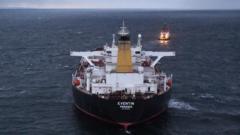German maritime authorities have successfully engaged in a rescue operation for the Eventin, a Russian-owned oil tanker that lost power, highlighting ongoing tensions regarding sanctions against Russia's oil industry following the invasion of Ukraine.
Germany's Maritime Authorities Respond to Russian Oil Tanker Incident in the Baltic Sea

Germany's Maritime Authorities Respond to Russian Oil Tanker Incident in the Baltic Sea
An oil tanker from Russia's "shadow fleet" has been salvaged in German waters, raising security concerns amid ongoing sanctions against Moscow.
Germany’s Havariekommando reported that the Panamanian-flagged Eventin was found adrift in the Baltic Sea, with maritime officials indicating it belongs to Russia's covert fleet used to bypass sanctions. Reports confirmed no oil leaks during the rescue efforts, with three tugboats deployed to tow the tanker back to safety.
On Friday, German officials noted that the Eventin was drifting at low speed in the Baltic Sea, north of Germany's Rügen island. It was indeed a significant incident since it flagged concerns about Russian maneuvers to circumvent international restrictions. German Foreign Minister Annalena Baerbock claimed that President Vladimir Putin has orchestrated tactics that compromise European security, emphasizing that the "shadow fleet" poses a growing threat.
The Eventin was carrying approximately 99,000 tonnes of oil when it lost power and steering. The CCME swiftly organized a team of specialists who were lowered onto the tanker via helicopter for towing preparations, ensuring it could be resolved without harmful environmental impacts. Following safety measures amid adverse weather, the convoy of tugboats was directed toward Sassnitz and is expected to arrive early Sunday.
Germany has previously implicated Russia in maritime disruptions, including severed cables and obscure vessel activities that violate maritime regulations. Last December, the EU expressed intentions to introduce measures targeting Russia's shadow fleet, which has been associated with unauthorized shipping activities globally.
The U.S. and the UK have amplified efforts against Russian oil companies, directly sanctioning Gazprom Neft and Surgutneftegas in a bid to cripple funding for the ongoing conflict in Ukraine. Nevertheless, Gazprom Neft criticized these sanctions as groundless, reflecting the deepening strain between Russia and Western nations aiming to isolate it economically.
As the maritime situation unfolds, the incident underscores the complexities and implications of modern geopolitical conflicts exacerbated through trade routes and maritime operations.
On Friday, German officials noted that the Eventin was drifting at low speed in the Baltic Sea, north of Germany's Rügen island. It was indeed a significant incident since it flagged concerns about Russian maneuvers to circumvent international restrictions. German Foreign Minister Annalena Baerbock claimed that President Vladimir Putin has orchestrated tactics that compromise European security, emphasizing that the "shadow fleet" poses a growing threat.
The Eventin was carrying approximately 99,000 tonnes of oil when it lost power and steering. The CCME swiftly organized a team of specialists who were lowered onto the tanker via helicopter for towing preparations, ensuring it could be resolved without harmful environmental impacts. Following safety measures amid adverse weather, the convoy of tugboats was directed toward Sassnitz and is expected to arrive early Sunday.
Germany has previously implicated Russia in maritime disruptions, including severed cables and obscure vessel activities that violate maritime regulations. Last December, the EU expressed intentions to introduce measures targeting Russia's shadow fleet, which has been associated with unauthorized shipping activities globally.
The U.S. and the UK have amplified efforts against Russian oil companies, directly sanctioning Gazprom Neft and Surgutneftegas in a bid to cripple funding for the ongoing conflict in Ukraine. Nevertheless, Gazprom Neft criticized these sanctions as groundless, reflecting the deepening strain between Russia and Western nations aiming to isolate it economically.
As the maritime situation unfolds, the incident underscores the complexities and implications of modern geopolitical conflicts exacerbated through trade routes and maritime operations.





















